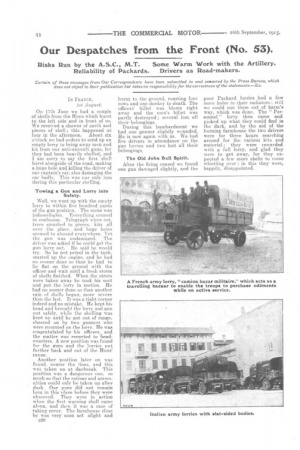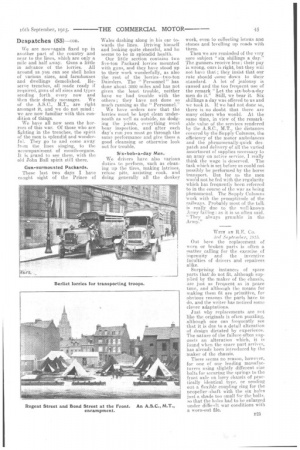Our Despatches from the Front (No. 53).
Page 4

Page 5

If you've noticed an error in this article please click here to report it so we can fix it.
Risks Run by the A.S.C., M.T. Some Warm Work with the Artillery. Reliability of Packards. Drivers as Road-makers.
Certain of these messages from Our Correspondents have been submitted to and censored by the Press Bureau, which does not object to their publication but takes no responsibility for the correctness of the statements.—En.
IN FRANCE, 1st August.
On 17th June we had a couple of shells from the Huns which burst to the left side and in front of us. We received a shower of earth and pieces of shell ; this happened at four in the afternoon. About six o'clock we had orders to send up an empty lorry to bring away men and kit from our anti-aircraft guns, for they had been heavily shelled, and I am sorry to say the first shell burst alongside of the road, making a huge hole and, killing the driver of our captain's car, also damaging the car badly. This was our only loss during this particular shelling.
Towing a Gun and Lorry into Safety.
Well, we went up with the empty lorry to within five hundred yards of the gun position. The scene was indescribable. Everything seemed in confusion. Telegraph wires cut, trees smashed to pieces, kits all over the place, and huge boles seemed to abound everywhere. Yet the gun was undamaged. . The driver was asked if he could get the gun lorry out. He said he would try. So he put petrol in the tank, started up the engine, and he had no sooner done so than he had to lie flat on the ground with the officer and wait until a fresh storm of shells finished. When the struts were taken away he took his seat and put the lorry in motion. He had no sooner done so than another rain of shells began, more severe than the last. It was a tight corner indeed and no mistake. He kept his head and brought the lorry and gun out safely, while the shelling was kept up until he got out of range, cheered on by two gunners who were mounted on the lorry. He was congratulated by his officers, and the matter was renorted to 'heademarters. A new position was found for the guns and the lorries put further back and out of the Huns' range.
Another position later on was found, nearer the lines, and this was taken up at daybreak. This position was a dangerous one, so much so that the rations and ammunition could only be taken up after dark. Our guns did not remain long in this elace before they were observed. They were in action when the first warning shell came along, and then it was a case of taking cover. The farmhouse close by was very soon set alight and B20 burnt to the ground, roasting four cows and one donkey to death. The officers' billet was blown right away and the men's billet was partly destroyed ; several lost all their belongings.
During this bombardment we had one gunner slightly wounded. He is now again with us. We had five drivers in attendance on the gun lorries and two lost all their belongings.
The Old John Bull Spirit.
After the firing ceased we found one gun damaged slightly, and the
poor Packard lorries had a few more holes in their radiators ; still we could run them out of harm's way, which was done. The " Personnel" lorry then came and picked up what they could find in the dark, and by the aid of the burning farmhouse the two drivers were for three hours searching around for the various kits and material ; they were rewarded with a full lorry, and glad they were to get away, for they expected a few more shells to come whistling over ; in this they were, happily, disappointed.
Despatches (55)--con.
We are nowsagain fixed up in another part of the country and near to the lines, which are only a mile and half away. Guns a little in advance of the lorries. All around us you can see shell holes of various sizes, and farmhouses and dwellings demolished. Reserve trenches, all made ready if required, guns of all sizes and types sending forth . every now and then their deadly messages. We of the A.S.C., M.T., are right amongst it, and we do not mind : we are now familiar with this condition of things.
We have all now seen the horrors of this war. Of those who are fighting in the trenches, the spirit of the men is splendid and wonderful. They go to and come away from the lines singing, to the accompaniment of mouth-organs. It is grand to see them, with the old John Bull spirit still there.
Gun-surtnounted Packards.
These last two days I have caught sight of the Prince of
Wales dashing along in his car towards the lines. Driving himself and looking quite cheerful, and he seems to be in splendid health.
Our little section contains two five-ton Packard lorries mounted with guns, and they have stood up to their work wonderfully, as also the rest, of the lorries--two-ton Daimlers. The " Personnel" has done about, 'WOO miles and has not given the least trouble, neither have we had trouble with the others ; they have not done so much running as the " Personnel." We have orders now that the lorries must be kept clean underneath as well as outside, no dodging the joints, everything must bear inspection, and after each day's run you must go through the same performance and give them a good cleansing or otherwise look out for trouble.
Six-bob-a-day Men.'
We drivers have also various duties to perform, such as cleaning up the tires, making latrines, refuse pits, assisting cook, and doing generally all the donkey
work, even to collecting inucics ana stones and levelling up roads with them.
Then we are reminded of the very sore subject " six shillings a day." The. gunners receive less; their pay is wrong, ours is right, but they will not have that ; they insist that our rate should come down to their standard. • A lot of jealousy is caused and the too frequent use of the remark 'Let the six-bob-a-day men do it." Still, we bear it. Six shillings a day was offered to us and we took it. If we had not done so, there is no doubt that there are many others who would. At the same time, in view of the remarkable value of the services rendered by the A.S.C.. M.T., the distances covered by the Supply Columns, the efficiency of the motor ambulances and the phenomenally-quick despatch and delivery of all the varied assortment of supplies necessary to an army on active service. I really think the wage is deserved. The task which is set before us could not possibly be performed by the horse transport. But for us the men would not be fed with the. regularity which has frequently been referred to in the course of the war as being phenomenal. The Supply Columns work with the promptitude of the railways. Probably most of the talk is really due to the well-known Army failing : as it is so often said. " They always grumble in the Army."
WITH AN B.E. Co.
.3rd September, 191.5. Out here the replacement. of worn or broken parts is often a matter calling for the exercise of ingenuity and the inventive faculties of drivers and repairers alike.
Surprising instances of spare parts that do not fit, although supplied by the maker of the chassis, are just as frequent as in peace time, and although the means for making them fit are primitive, for obvious reasons the parts have to do, and the writer has noticed some clever adaptations.
Just why replacements are not like the originals is often puzzling, although one can frequently see that it is due to a detail alteration of design dictated by experience. The nature of the failure often suggests an alteration which, it is found when the spare part arrives, has already been introduced by the maker of the chassis.
There seems no reason, however, for one of our leading manufacturers using slightly different size bolts for securing the springs to the front axle on lorry chassis of practically identical, typ e, or sending out a flexible coupling ring for the propeller -shaft. with the six holes just a, shnde too small for the bolts, so that the holes had to be enlarged under difficult war conditions with a worn-out file.




















